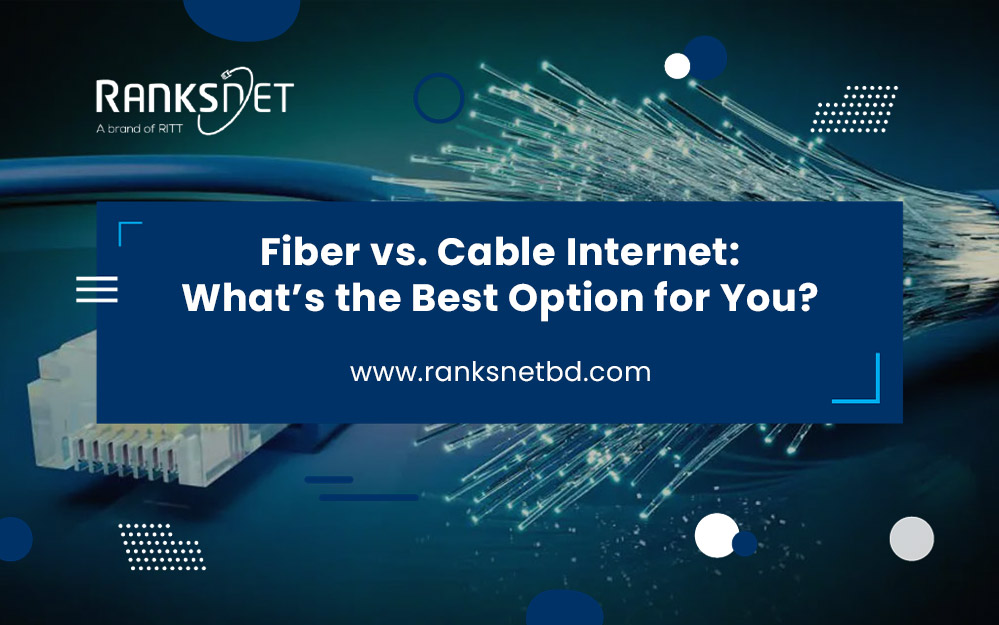In the fast-paced digital world we live in, having a dependable internet connection is no longer a luxury, it’s a necessity. However, choosing between the various types of connections available can be overwhelming.
If you’re debating between fiber and cable internet, you’re not alone. Both options offer high-speed internet but with different advantages and disadvantages. While fiber is known for its lightning-fast speeds, cable internet is often more widely available and easier to install.
In this blog post, we’ll explore the differences between the two options to help you decide which one is the best fit for your needs. So, let’s dive in and find out which type of internet connection is right for you!
Comparison between Fiber Internet and Cable Internet
Nowadays, having a fast and reliable internet connection is essential for staying connected with family, friends, and the world. But with so many different types of internet connections available, you may get confused about choosing between them. Two of the most popular options are fiber and cable internet.
While both provide high-speed internet, they have distinct differences in terms of speed, reliability, cost, and availability.
| Criteria | Fiber Internet | Cable Internet |
|---|---|---|
| Technology Used | Thin strands of glass (fiber-optic cables) | Copper coaxial cables |
| Speed | 50 Mbps to 2 Gbps, symmetrical speeds | 10 Mbps to 1 Gbps, asymmetrical speeds (faster downloads) |
| Reliability | Highly reliable, not affected by electromagnetic interference | Less reliable, susceptible to electromagnetic interference |
| Availability | Less widely available due to newer technology | Widely available, especially in rural or remote areas |
| Cost | Tends to be more expensive | Generally less expensive, budget-friendly |
| Installation | Requires significant infrastructure investment | Infrastructure is often already in place, easy to install |
| Ideal For | Heavy internet users, simultaneous activities | Moderate internet usage, budget-conscious users |
| Bundled Services | Limited availability of bundled services | Most providers offer bundled services, cost-effective |
| Decision Factors | Internet usage, budget, availability, need for bundled services | Internet usage, budget, availability, preference for bundled services |
In this blog post, we’ll explore the differences between fiber and cable internet to help you decide which one is the best fit for your needs.
What is Fiber Internet
Fiber internet is the fastest and most reliable type of internet connection currently available. It uses fiber-optic cables made of thin strands of glass to transmit data as pulses of light.
This technology is more efficient than traditional copper wires used in cable internet, resulting in faster and more reliable internet speeds. Fiber internet is capable of delivering symmetrical speeds, meaning you’ll get the same upload and download speeds.
-
Speed
Fiber internet speeds can range from 50 Mbps to 2 Gbps, making it the fastest internet option available to most consumers. This speed allows for smooth and fast online gaming, streaming, and downloading large files without buffering or interruptions.
It’s also ideal for households with multiple users who need to use the internet simultaneously without any lag.
Read this article to know good internet speed for home.
-
Reliability
Fiber internet is known for its reliability, which is attributed to the technology used. The fiber-optic cables are more durable than traditional copper cables, and they’re not affected by electromagnetic interference, which can slow down or disrupt cable internet.
This makes fiber internet less susceptible to outages, meaning you’ll have consistent and reliable internet speeds, even during peak usage times.
-
Availability
Fiber internet is not as widely available as cable internet, primarily because it’s a newer technology and requires significant infrastructure investment.
However, many internet service providers (ISPs) are expanding their fiber networks, and the availability of fiber internet is increasing rapidly. If fiber internet is available in your area, it’s worth considering, as it offers the best internet speeds and reliability.
Read Also: How Does Fiber Internet Work
-
Cost
Fiber internet tends to be more expensive than cable internet, but this can vary depending on the provider and the location. The cost is usually higher due to the cost of installing and maintaining the fiber-optic cables.
However, the price of fiber internet is gradually decreasing as more providers enter the market, making it more accessible to consumers.
What is Cable Internet?
Cable internet uses copper coaxial cables to transmit data, and it’s the same technology used for cable television. Cable internet is more affordable than fiber internet and is ideal for households with moderate internet usage.
-
Speed
Cable internet speeds can range from 10 Mbps to 1 Gbps, making it slower than fiber internet. However, it’s still fast enough for most internet activities, such as browsing, streaming, and online gaming.
Cable internet speeds are asymmetrical, meaning that the upload speeds are slower than the download speeds.
-
Reliability
Cable internet is generally less reliable than fiber internet due to the technology used. Copper cables are susceptible to electromagnetic interference, which can cause slow internet speeds and outages.
This is especially true during peak usage times when many people are using the internet simultaneously. However, cable internet providers have made significant improvements in recent years, and outages are becoming less common.
-
Availability
Cable internet is available and an excellent option for those in rural or remote areas where other types of internet connections are not available.
It’s also easy to install, as the infrastructure is already in place in most areas. Cable internet is offered by most ISPs, including major providers like Comcast, Spectrum, and Cox.
-
Cost
Cable internet tends to be less expensive than fiber internet, making it an excellent option for those on a budget. The cost of cable internet depends on the provider, location, and internet speed.
Most cable internet providers offer bundled services, such as TV and phone, which can make it more cost-effective than fiber internet.
Which Option Is Best for You?
The decision between fiber and cable internet depends on your individual needs and circumstances. Here are some factors to consider when choosing between the two options:
Internet Usage
If you’re a heavy internet user who streams a lot of videos, plays online games, or downloads large files, then fiber internet is the best option. It offers faster and more reliable speeds, which will enhance your online experience.
Budget
If you’re on a tight budget, then cable internet is a more affordable option. It offers fast speeds at a lower cost than fiber internet. However, you’ll have to sacrifice some speed and reliability.
Availability
Fiber internet is not as widely available as cable internet, so you’ll need to check if it’s available in your area. If it is, then it’s worth considering, as it offers the best internet speeds and reliability.
Bundled Services
If you’re looking for bundled services like TV and phone, then cable internet is the best option. Most providers offer bundled services, which can be cost-effective.
Conclusion
So, both fiber and cable internet have their advantages and disadvantages. Fiber internet is the fastest and most reliable option, but it’s not as widely available as cable internet, and it’s more expensive. Cable internet, on the other hand, is more widely available, more affordable, and ideal for households with moderate internet usage.
Ultimately, the decision between the two options depends on your individual needs and circumstances. Consider your internet usage, budget, availability, and bundled services before making a decision.
Frequently Asked Questions
Is fiber internet more reliable than cable internet?
Yes, fiber internet is generally more reliable than cable internet. This is because fiber cables are less susceptible to interference and signal loss than coaxial cables used for cable internet.
Is fiber internet more expensive than cable internet?
Fiber internet can be more expensive than cable internet, but it often comes with higher speeds and more reliable service. The cost of internet service varies depending on your location and the provider you choose.
Why is fiber faster than cable internet?
Fiber relies on light instead of electricity to transmit data, which facilitates much faster Internet connections that are capable of handling higher bandwidth. According to the FCC, fiber providers consistently offer 117 percent of advertised speeds, even during times of peak demand.
Why is fiber so expensive?
Is fiber optic internet cheaper? Fiber optic internet is more expensive than traditional cable, DSL, and phone company internet services. This is because fiber optic cables are made of glass, which is a more durable and reliable material than the plastic used in other cables.
Which one should I choose – fiber or cable internet?
The choice between fiber and cable internet depends on your specific needs and circumstances. If you need high speeds and reliable service, fiber internet may be the better option. If cost is a major factor, cable internet may be a more affordable choice.



